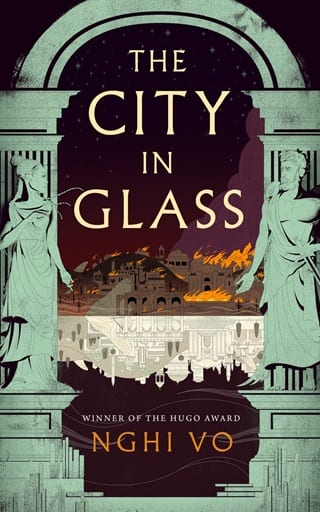Chapter One
ONE
From the topmost tower of the observatory to the floating docks on the beach, the city of Azril lit up with paper lanterns, with candles, with girls throwing flaming knives and boys in firefly crowns, with passion, with desire, with hatred, and with delight.
When Vitrine first arrived, Summersend had been a fast, a time when the people of Azril kept indoors with black flags hung over their windows and ate dry bread dusted with salt as a reminder of flesh and the sea. Perhaps some, particularly devout, stood in the squares and mortified themselves with grief and goat-hair shirts, but it was a lackadaisical kind of fervor even then. Vitrine had looked into the dour heart of the penance and found within it sparks she could coax to life, nursing them over the glass cabinet in her chest until they glowed. As tender as a demon could be, she nourished them on good years and bad, on silks brought from Kailin and barrels of oysters from Brid. She fed the festival on her own blood and her own laughter until it bloomed like a bonfire.
Now, right before the end, the city threw up towering light and shadows as long as dragons, and the only remnant of the black mourning flags were the colorful veils that the celebrants wore. The veils were too sheer to hide their faces, but they spun as the people danced the old dances and the new dances and of course the ganli, so fast that they might leave death and sorrow far behind them. As Vitrine passed through the crowds, bells on her ankles and her dark skin gleaming under the torches, she thought of what she would write in her book.
Tonight, my Azril beats like the heart of the world.
She allowed a mischievous girl to loop a strand of coral beads around her neck, and she smiled at the grinning boy who offered her a skewer of grilled chicken studded with brined olives. It wasn’t given to demons to bless those they favored, so instead she gave them gifts: an eye that would see through lies for the boy and the knowledge to tell good from evil and the ability to ignore it for the girl. They would not be good, but they would be interesting, and Vitrine reminded herself to write their names in her book.
She spent a brief while cooling her bare feet in the fountain where a half-dozen children caught the sleeves of passersby for candy and coins. When she tired of that, she went to rap on the boarded-up windows of the green house on Malaki Street, where there lived a shivering young man, the grandson of a courtesan she had cared for a great deal. Vitrine still had hopes for him, but they were of a different sort than what she had nurtured before he started to fear the open avenues and the broad sky and sea.
“Darling, my darling,” she whispered through the boards. “Are you well tonight? Are you safe?”
A moment later, a voice came from within, guarded but supple, entirely without cracks.
“I am. Yesterday I received a book of stories from Valnesse and a pamphlet about the glass-winged butterflies of Noor. It’s amusing—they seem to think the butterflies are real.”
“Who knows but they might be,” Vitrine said cheerfully. “Have a good night.”
“You as well. Blessed Summersend to you.”
The neighborhood speculated ferociously on what treasures the young man kept behind his boarded windows and his thick walls. Some guessed a fortune in pearls, others supposed ingots of gold gotten from his grandmother’s estate. No one even suspected that he had kept more books in one place than any other on the continent, holiest and heresies and art and trash.
Five years ago, he had learned that he could not tolerate people, and so the stacks of books grew to keep him company. There were the slender towers of botany treatises as short and delicate as children, the fat stacks of romances that seemed buxom despite their corners, the stalwart disquisitions of war that could be used to build a fortress themselves. Soon, she hoped, he might open at least a window to the outside; if he would not leave himself, perhaps his books would fly out and live in the hearts of those who needed them, just as she needed the book that lived in her own chest.
Vitrine wanted that collection for the city, but the young man would not be young and healthy forever. She could wait for her library.
In the meantime, Vitrine amused herself on Law Street, where tonight the fools and the beggars wrote the rules while the august advocates borrowed their motley and rags to run drunk down the lane.
Vitrine whiled away some time encouraging the wise fools and the foolish solicitors, and then she followed a pack of masked women on their way to one of the manors in the western district, their smiles as plush and red as fox tails.
It was Marius Cantavi commanding their presence, and Vitrine fell to the end of the line as the women circled his private chamber under his critical eye. The women were from the one of the finest houses on Carnelian Street, black velvet roses pinned to their breasts, cheeks dusted with glittering mica, and they were like music given form as they waited for the wealthy man’s decision.
Marius walked among them, enjoying the selection more than he would what came later, and Vitrine cast her blacker than black eyes at him, a sting of desire making him pause. Vitrine stood as docile as stone as he reached for her mask, but when he removed it, he found not the face of a woman but instead something beaked and snapping, the feathers crawling with lice and the eyes rimed with rheum and fury.
He shrieked with dismay, and Vitrine laughed as she left the women from Carnelian Street to sort out the rest. They might soothe their patron or they might rob him blind, and it was all the same to the demon of Azril as she tripped back into the streets.
She picked out the son of the Lord Mayor among a group of maskers, and sent after him a footpad with a lump of iron in a stocking. She had been on the tightrope about him for a while, weighing his courage against his temper, and in the spirit of the festival, she decided to let him stand the test. If he survived the footpad, well and good; she would see what might be made of him. If not, there were plenty of other exciting prospects to be found.
She rested for a while on a rooftop off of Marrowbones Square, the green slate cool against her bare back and one ankle propped jauntily on the opposite bent knee. A lithe gray cat came to investigate her business in his territory, and satisfied, he climbed up on her chest to purr his approval. Vitrine grunted as his heavy little feet sank into her breasts and her belly, but she scratched him behind the ears as his eyes drifted shut.
“Well, well, little lord rat-catcher. I remember your many-times great-grandmother, don’t I? She would be so proud to see how far her family has come, and what a fine sir you look…”
Vitrine turned her head to the side as the cat butted his forehead too hard against her chin, and when her ear touched the roof, she heard the sound of crying below. It wasn’t such an uncommon thing for someone to cry through Summersend, but giving the cat one last scratch, Vitrine wound her way like smoke into the house underneath her.
It was a heartbreak, and Vitrine examined the sharp edges of the fight, the hard words that lay strewn on the girl’s floor like shards of glass, the way her tears tasted of hurt and of fury and perhaps just a little of relief.
“You are all made quite badly,” Vitrine complained to the girl who lay face-down in her bed. “If you were like us, you would never bother with hearts that broke or took on poison like this.”
In the end, because she could not take out the girl’s broken heart and replace it with something more suitable, she only sat on the edge of the bed to stroke the girl’s box braids. They were lovely, beaded with tight copper coils, and with every stroke of her hand, the girl’s memories fell away, dissipating into the air like grave dust. Soon enough, the girl rested easily, and Vitrine kissed the crown of her head before slipping out.
The pleasure in Azril, she thought as she walked past a savage beating in the alley, was that it was not done yet. She had arrived clinging to the dreams of a refugee woman from the south, and at first, all she could do was hurry the city along, longing for the great spires and the royal greenhouses and the grand bazaars she had left behind her.
It had taken a hundred years before she was willing to slow down, another hundred after that before she went back and tore out some of her early efforts and refined others. It would never be lost Saqarra, which was empty even of revengers and scavengers by now, and Vitrine had come to realize that it never could be.
I don’t need it to be, she thought with some satisfaction and pride. It is Azril. It may never be finished, and yet it is still enough.
Vitrine wove through the riot like a light-footed cat, and as she passed, people grew rosy with desire, drunk with love, wild with need for something that surely danced just beyond their fingertips. They did not know it, but they loved her, and she brushed her fingertips over their cheeks and their lips and their brows, promising them that she loved them too.
Before it was anything else, before it had a name or an observatory or the beginning of a library or a mayor or a demon, Azril had been a port town, and the tradition of the ghost ship was sacred. At midnight, Vitrine made her way to the floating docks with a torrent of people in veils, dancing and laughing and shouting with joy for they were no longer the dour fishermen and raiders they had been.
The ship given up for sacrifice that year was an old trading craft, the triangular sail rent into rags from top to bottom and a hole big enough for a large man to crawl through right above the waterline. The boys and girls of the town had spent the last two days decking the caravel out with paper flowers, and Azril’s own master pyrotechnician had seeded the ballast with gunpowder and sprinkled the deck with the same. The small dishes of wine laid out across the deck would perhaps help feed the flames as well, but Vitrine knew that long ago, they had been for her, and she was still flattered.
Invisible, Vitrine stood by the pyrotechnician’s shoulder as she checked the laden bags one more time, her burn-slicked fingers probing for any dampness, any obstruction that would prevent the blaze. Twelve years ago, the ship had failed to light at all, and Vitrine nodded, pleased at her diligence.
“That was an unlucky thing,” she told the pyrotechnician. “Your predecessor hanged herself from shame, and I do not know if anyone who was there will forget the wailing.”
Satisfied that the bags were dry, the pyrotechnician made her way back to the docks in a small coracle, and when she arrived, she nodded at the Lord Mayor’s son, who was bloodied and a little shaken, but alive. He stood on the foremost pier, the arrow nocked in his hands wrapped about with an oily rag. As Vitrine stood next to him, smiling as proudly as the ghost of his mother on the other side, he held the arrow to a torch.
The flaming arrow arced through the sky like a comet. Vitrine watched it unblinking in wonder, and when it struck the bale of dry straw on the deck, there was only a count of nine before the fire started. Like children, the flames danced along the deck, crawling up the rigging and curling over the rails. There was a moment of almost peaceful stillness as the black water shone like a broken mirror with firelight, and then the flames found the charges of gunpowder in the ballast.
The boom struck Vitrine square in the chest, and as a dark billow of smoke rose up to the clear sky, she clasped her hands in front of her in joy.
It was only when Vitrine turned to the open sea that she saw the moon, setting now and reflecting silvery shards on the choppy water. Many things could come on a broken road like that, and then she saw the angels.
They were as tall as the topmost masts of the ships in the harbor, and their wings stirred with the winds of hurricanes. As a courtesy to the world they deformed with their presence, they went on two legs and reached out with two hands, but their faces were as blank as shields while crowns of flames spun about their heads.
The cry went up immediately, and in the chaos of people running for the safety of Azril’s walls, many were pushed into the water or trampled outright. Vitrine felt their screams like the beating of wings against the glass case in her chest, and if she opened to them, she would crack. Instead she stared at the angels come to Azril, frozen at the head of the pier, and in a moment, entirely alone.
Arrogant, was Vitrine’s first thought, that they would walk so mighty through the world. Demons learned humility with their first mouthful of dirt, their first mouthful of blood, and angels had never learned it at all.
No, Vitrine thought, as the first in the line of four stopped by the flaming ship. It hurt to look at, too much, too strange, and too livid with grace. The fire of the ritual, birthed with love and duty from the hands of the master pyrotechnician, faltered with shame before the angel, shrank away from its greater light and its greater indifference.
Vitrine watched as the angel gently killed the fire, suffocating it under its hand as it passed by, walking the moon road to the floating dock where Vitrine stood alone. By the time they reached her, they had shrunk their visible part down to the size and shape of men, and they looked like men, mostly, though she could see under their mendicant robes that one bore the feet of a great bird, and another went cloven-hoofed. They were dark like she was dark but prouder by far, with shoulders never bowed by defeat.
“Will you give way?” the first angel asked formally, and Vitrine’s lips peeled back from her teeth.
“Go fuck yourself,” she advised the angel.
The angel’s face, handsome, bearded, eyes sunk deep in his well-shaped skull, did not move.
“Will you prostrate yourself for grief?” he asked.
“Fuck your brothers,” she answered, glancing at the ones behind him. They were even stiller than he was, as if he had at least something of the trick of seeming human and they had it not at all.
“Will you beg?” the angel asked.
“Fuck the road you walked on, the sky you fell out of, the clouds that shielded you from rain, and anyone who gave you a moment of peace or comfort. Fuck everything that brought you here to stand in front of me without knowing what shame is, and when I dance on the wind, I will turn the names that were given to you to mud—”
“Enough.”
Something flickered through the angel’s black eyes, something enough like irritation that Vitrine paused when otherwise she would have kept on.
“We are sent to bring the city to the ground,” the angel said. “We come with fire and with might, and so will the city of Azril be torn from the tapestry of the world.”
Vitrine didn’t believe him. There was nothing in her that could believe his words no matter what she knew of angels and their opaque purpose in her world.
“No,” she said, shaking her head. “You will not.”
The angel made to move past her, and without thought, she put herself in front of him, her arms spread like wings. He stopped in surprise, and she had to crane her neck to look up at him.
“Stop,” she said.
“You know we will not,” he said, his tone measured.
Vitrine swallowed, looking down at her bare feet.
“Would it have stopped you? If I had begged?”
“No.”
Vitrine’s hands twitched and when they came up, they were clawed, her nails tipped with iron and glowing hot. With one swipe she cut him open from groin to throat, leaping as she did so to knock him back among his brothers like a game of tenpins.
There was a moment of complete and savage satisfaction when she saw something move on their awful silica faces, that looked as if they had been hewn from an indifferent cliff face some thousands of years ago and never changed since. Now they were shocked and outraged, offended in their dignity even as their brother fell among them, and she came right over him like a hunting cat ready to cut and maul. She wanted to tear at their faces to see if it would bloody them, to reduce them at least to humiliated birdlike squawks.
Of course it couldn’t last, and as the angel in the lead staggered up to his feet, the rearmost one who had not stumbled at all touched a fingertip to her shoulder, a look that might be scorn if he were not so holy on his face.
“Fuck you,” she spat again, and then with a fingertip alone, he flung her into the harbor, almost past the smoldering ship. Vitrine hit the water with a force that made it feel as if she had hit stone instead, and inside her, the bones that she kept to better walk as a human among humans broke, smashing against each other like the sides of a ship struck with a battering ram.
She sank through the cold water, numb and unable to move anything save her fingers. In the beginning, before there were words to speak, she and her family had spoken with their hands, gesturing food and hate and anger and new to each other with increasing urgency. Now her hands fluttered with the sign for no over and over again, and it was only when she touched the silty bottom of the harbor, littered with broken clay pipes, bone buttons, and bones, that she was finally able to surge towards the surface.
Vitrine fought against her broken body, moving her arms and legs like oars, and when she broke through the surface, she was looking up at the sky above Azril. From where she floated in the harbor, the wreck of the caravel on her right and the ashen cliffs on her left, she could see the highest peak of the observatory, the slanted roof of the Lord Mayor’s house, the elegant spire of the house of the courtesan-general. The city was still lit up like a bonfire, and from that bonfire four sparks flew up into the sky.
Like comets who found the earth too cruel, Vitrine thought helplessly, and as she watched, the angels, somewhere between their man-shapes and the giants of light who had come walking over the water, wove a circle over the city. They flew so fast that their flaming tails grew longer and longer still as they braided their paths together, forming a ring of terrible heat. It pulsed orange, it glowed red, and finally it went white and soft around the edges in a way that hollowed Vitrine with dread, that light that fell on Azril, crowning the city in inferno.
The heat sent a boom of hammer-like force through the air, smashing the water and setting it to a boil. Vitrine in the water screamed as her skin bagged on her flesh, as her flesh cooked inside her skin. If she was a human, it would have killed her immediately, but she was not, and for a short and terrible space, not longer than four breaths, she was aware enough to feel her lungs burst and her liver split, to hear the terrible ringing of the explosion itself before her eardrums ruptured and she could hear no more.
Before she was blinded, she saw the observatory tower crack straight down the middle, and she thought, before she could no longer think at all, of the quartet of bodies she had seen entombed in those stone walls to keep them strong and sound.
The water, hot and salt like tears, took her again as she crumpled into darkness.
 Fullepub
Fullepub 



